八年级上册比较级
人教版八年级英语上册比较级课件

4. If this Sunday your classmates and you want to have a picnic , where would you like to go? And why?
❖ 11.It’s necessary for you to do sth. 你有必要做某事 ❖ It’s easy to do sth. ❖ It’s hard to do sth. ❖ 12. win the match ❖ win the prize ❖ beat sb. ❖ lose the match ❖ lose to sb. ❖ 13. have good grades 有好成绩 ❖ 14. English Study Center 英语学习中心
3. Lucy is a lot taller than Lily.
4. Lucy is 5 cm taller than Lily. 5.Mr. Li is much more serious than you. Pizza is less delicious than hamburger.
最高级的用法
The bird flies high. Which flies higher,the plane or the bird?
The plane flies higher than the bird .
Jim goes to bed late. Who goes to bed later, Jim or Tom ?
八年级上册比较级和最高级
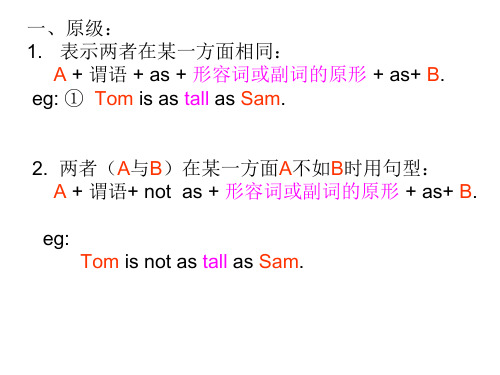
10. My mother’s car is ________________ than my father’s . (expensive)
Exercises ( B )
1. Tom is t_h_e_ta_l_le_st__ boy in our class. ( tall ) 2. Of all the girls, Sue is _th_e__pr_e_tt_ie_st___ ( pretty ).
① My mother is the busiest in my family
② Tom is the tallest of all the students.
2、one of the+形容词最高级+cn.复数 “最……之一”。
Beijing is one of the largest cities in China.
thin —thinner—thinnest
hot —hotter—hottest
⑤多音节词或部分双音节词的比较级和 最高级在其前面加more或most。
beautiful—more beautiful—most beautiful important—more important—most important
(7)修饰比较级的词 much(…的多)、far (…的多)、 a lot(…的多)、even(更…)、still(仍然)、 any (任何) a bit(…一点儿) a little (…一点儿)
eg: ① This city is much more beautiful than that one.
句型转换:
1. Tom is tall. Jim is short.(比较级合并)
八年级上册英语形容词副词的比较级与最高级

形容词副词的比较级与最高级基础过关一、比较级的定义:大多数的形容词都有三个级别:原级、比较级、最高级。
其中比较级表示“更……”,用于两者之间的比较,用来说明“前者比后者更……”,比较级前面一般用much, even, a little修饰,其中even, much 只能修饰比较级。
比较级的构成:比较级和最高级的构成1)加-er,-est构成比较级和最高级。
单音节形容词和副词以不发音的-e结尾的High higher highest safe safer safest Hard harder hardest late later latest small----smaller----smallest large----larger----largestnew----newer----newest nice----nicer----nicest辅音字母要双写的情况以辅音加-y结尾的情况Big bigger biggest dry drier driest Hot hotter hottest merry merrier merriest Thin thinner thinnest easy easier easiest 1. 写出以下各形容词的比较级和最高级:1. nice ______________________2. fat ____________________3. slow _____________________4. dry ____________________5. happy ____________________6. wet ____________________7. thin ______________________ 8. far ____________________9. early _____________________ 10. careful_________________15. exciting ___________________ 16. busy __________________2. 根据句意,用所括号内所级形容词的比较等级形式填空:1. Mr. Smith is man in this office. (rich)2. Winter is season of the years. (cold)3. This radio is not so as that one. (cheap)4. It is much today than yesterday. (hot)5. She is a little than her classmates. (careful)6. people came to the meeting than last time. (many)7. Which book is , this one or that one? (easy)8. My room is than yours. (small)9. Hainan is from Beijing than Hunan. (far)10. Skating is than swimming. (exciting)11. Jim is than all the others. (honest)12. The higher you climb, the it will be. (cold)13.There are boys than girls in our class. (few)2) 加more, most构成比较级和最高级多音节的形容词由形容词加-ly构成的副词expensive more expensive most expensive slowly more slowly most slowly carefully more carefully most carefully highly more highly most highly 以-ful,-less,-able,-ous,-ive, -ing等结尾的双元音形容词useless more useless most uselessserious more serious most serious分词形容词tired,pleased及glad,often,real, right,wrong等单音节形容词。
八年级上册英语比较级语法归纳

八年级上册英语比较级语法归纳一、比较级的定义。
比较级用于两者之间的比较,表示“更……”的意思。
例如:This book is more interesting than that one.(这本书比那本书更有趣。
)二、比较级的构成。
1. 规则变化。
- 一般在形容词或副词后加 -er。
- 单音节词:如tall - taller(高的 - 更高的),fast - faster(快的 - 更快的)。
- 以e结尾的单音节词,直接加 -r。
例如:nice - nicer(好的 - 更好的)。
- 以重读闭音节结尾,且末尾只有一个辅音字母的词,双写这个辅音字母,再加-er。
例如:big - bigger(大的 - 更大的),hot - hotter(热的 - 更热的)。
- 以“辅音字母 + y”结尾的双音节词,把y变为i,再加 -er。
例如:easy - easier(容易的 - 更容易的),heavy - heavier(重的 - 更重的)。
- 多音节词和部分双音节词(通常是在词前加more来构成比较级)。
例如:beautiful - more beautiful(美丽的 - 更美丽的),carefully - more carefully (仔细地 - 更仔细地)。
2. 不规则变化。
- good/well - better(好的/好地 - 更好的/更好地)。
- bad/badly - worse(坏的/坏地 - 更坏的/更坏地)。
- many/much - more(许多 - 更多)。
- little - less(少的 - 更少的)。
- far - farther/further(远的 - 更远的,further还可表示“更进一步”的抽象意义)。
三、比较级的用法。
1. 比较级 + than。
- 这是比较级最常见的用法,表示一方比另一方更……。
例如:- He is taller than me.(他比我高。
人教版英语八年级上册 比较级最高级归纳
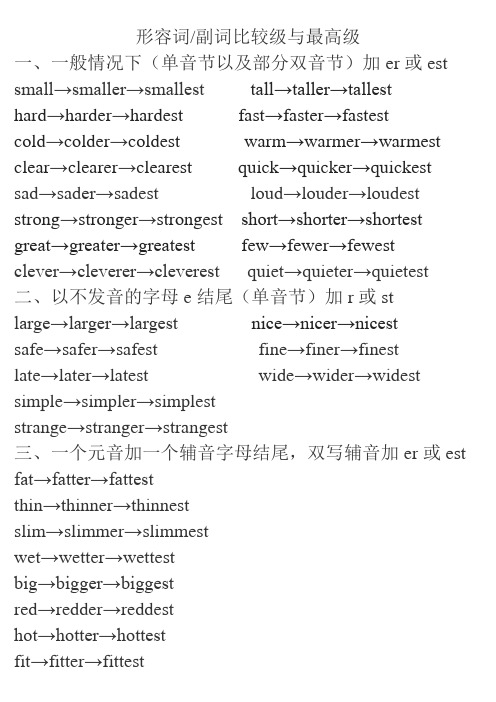
quietly→morequietly→mostquietly
loudly→moreloudly→mostloudly
slowly→moreslowly→mostslowly
quickly→morequickly→mostquickly
sadly→moresadly→mostsadly
happily→morehappily→mosthappily
carefully→morecarefully→mostcarefully
serious→moreserious→mostserious
similar→moresimilar→most similar
lovely→lovelier→loveliest friendly→friendlier→friendliest
五、双音节以及多音节词前加more或most
outgoing→moreoutgoing→mostoutgoing
beautiful→more beautiful→most beautiful
big→bigger→biggest
red→redder→reddest
hot→hotter→hottest
fit→fitter→fittest
四、辅音字母加y结尾,变y为i加er或est
easy→easier→easiestangry→angrier→angriest
busy→busier→busiestheavy→heavier→heaviest
terrible→moreterrible→most terrible
delicious→moredelicious→most delicious
八年级上册Unit6比较级与最高级课件

最高级前面一般要加定冠词the, 后面可带in(of)短语来说明比
较的范围。
句子中常含有表示程度的状语, 如much,by far,nearly, almost,by no means,not quite,not really等。
04
常见错误及注意事
项
忽略冠词使用错误
忘记在比较级前加定冠词“the”,如“John is taller than Tom.”(正确表达应为 “John is the taller of the two.”)
VS
题目
Of the two coats, she'd like to choose the _______ one to save money for a book.
选择题解析
• A. cheapest B. cheaper C. more expensive D. most expensive
运用比较级和最高级 时需要注意的问题
角色扮演
角色扮演的目的
通过模拟购物场景,让学生在实践中运用比较级和最高级 描述商品,提高其语言运用能力和交际能力。
角色分配
学生分为顾客和售货员两组角色,每组角色轮流扮演。
商品描述
学生运用比较级和最高级描述商品的特性、价格、质量等 方面,如“这件衣服比那件更漂亮”、“这种水果是这里 最便宜的”等。
在最高级前误用不定冠词“a/an”,如“She is a most beautiful girl.”(正确表 达应为“She is the most beautiful girl.”)
忽略修饰语使用错误
在比较级前误用程度副词,如“John runs much more quickly than Tom.”(正确表达应为“John runs much faster than Tom.”)
八年级上册形容词比较级
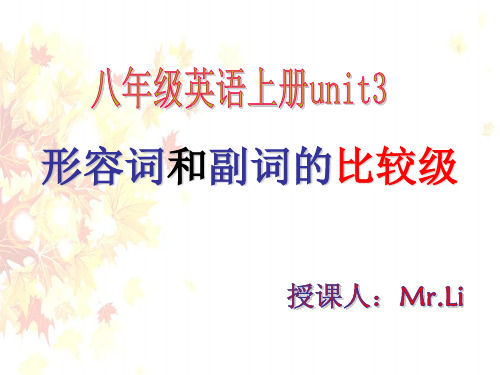
注意:
当A在范围之内比较时,必须加other;当A不在 范围之内比较时,要去掉other。
形容词和副词的比较级
一、形容词(adjective),副词(adverb)的定义
形容词是描述,修饰名词或代词,说 明事物或人的性质或特征的词。
eg. He is a good boy.
副词在句子中修饰动词、形容词、 其他副词或整个句子,用来表示时 间、场所、状态及程度。
eg. He studies hard .
2.表示两者(A与B)在某一方面A不如B时,用not as…as或者not so…as结构:
①A+be+not+as/so+形容词原形+as+B
eg: Tom isn’t as tall as Sam. Tom不如Sam高。
②A+助动词(do/does/did)+not+实义动 词原形+as/so+副词原形+as+B
不规则变化:
原级 good ,well bad, badly,ill many ,much l more less
far
farther距离, further程度
old
older, elder
小贴士 1.older 一般指年龄大小; My father is older than my mother.
“比较”出来的英语
八年级(上)比较级ppt课件

1
一、形容词和副词的概念
形容词:修饰名词或代词,表示性质,特征 或属性一种词类。 它在句中作定语、表语和宾语补足语。 副词:用来修饰动词、形容词及其他副词。 副词在句中多作状语。
2
二、形容词和副词的用法
①形容词作定语一般放在被修饰的名词之前。 如: a new book, two big trees
This pen is much better than that one.
Tom is a little shorter than his friend Jim.
原级的修饰
原级前面可以用very, too, so, quite等修饰
very tall, too hot, so cold, quite interesting
15
2、“A和B哪一个更···?” Which/Who +is/行为动词+比较级, A or B?
Which is more popular, the TV or the movie? Who studies harder, Jim or Jack?
3、“越来越···” 比较级+and+比较级(单音节词) more and more +原级(多音节词) The weather is getting colder and colder. He runs faster and faster. Our hometown is more and more beautiful. Shopping online is more and more popular.
She is as beautiful as her mother. The book is as new as that one. The question is not as / so difficult as that one. My bike is not as / so big as yours. 注意: The question is not so difficult as that one. =The question is easier than that one.
八年级英语上形容词比较级最高级

八年级英语上形容词比较级最高级形容词,副词的比较级、最高级变化规则.一般在词尾直接加er或est,例如,tall-taller-tallest,long-longer-longest2.以不发音的字母e结尾的单词在词尾直接加r或st,例如,nice-nicer-nicest3.以辅音字母+y结尾的词,把y变为i,再加er或est,例如,heavy-heavier-heaviest4.重读闭音节,末尾只有一个辅音字母,双写这个辅音字母,再加er或est,例如,big-bigger-biggest fat thin red wet5.部分双音节词和多音节词分别在原级前加more构成比较级和most构成最高级,例如,slowly-more slowly-most slowly;beautiful-more beautiful-most beautiful ( tired often )二、不规则变化原级比较级最高级good/well better bestmany/much more mostbad/ill/badly worse worstlittle less leastold older/elder oldest/eldestfar farther/further farthest/furthestⅣ形容词,副词等级的用法一、原级的用法1.只能修饰原级的词,very,quite,so,too例如,He is___________to walk on.他太累了以至于不能再继续走了。
My brother runs _______________I can?t follow him.我弟弟跑得那么快以至于我跟不上他。
2.原级常用的句型结构(1)―甲+动词+(倍数)+as+形容词原级+as+乙‖表示―甲和乙程度相同‖或―甲是乙的几倍‖例如,汤姆和凯特年龄一样大。
______________________________________________ 汤姆和迈克跑得一样快。
人教版八年级上册第三单元比较级课件(共13页)

smart
smarter
good
better
quickly more quickly
tall
taller
nice
nicer
big
bigger
little
less
late expensive thin
later more expensive thinner
high fat interesting
higher fatter more interesting
than me.
4. Lily is _______he(ahveiaevry) than Lucy. And Lucy is _______ (thin) than tLhiilnyn. er
5. I have _______sh(sohroterrt) hair than Tina. 6. Tom is _____(bgetotoedr) at playing baskteball than
nice
nicer
(以不发音的字母 e 结尾的 + r )
thin
thinner
(重读闭音节词词尾只有一个辅音字母时,先
双写辅音字母再 + er)
early
earlier
(以辅音字母 + y 结尾的单 词,变 y 为 i + er )
outgoing more outgoing
(多音节词和部分双音节词前加more)
原级
good/well bad/badly many/much
little far
不规则变化
比较级 better worse more less farther/further
八年级上册形容词和副词的比较等级

形容词和副词的比较等级一、形容词和副词有三个等级:1.原级.2。
比较级,表示“较……"或“更……一些”的意思。
3。
最高级,表示“最……”的意思.二、形容词、副词比较等级的构成:(一)、规则变化:①一般直接在形容词或副词后加-er或—est,如:small -——smaller --- smallest long-—-longer---longest②以不发音—e结尾的形容词或副词直接加–r或–st,如:large --- largest --—largest nice--—nicer—--nicest③以重读闭音节结尾,且末尾只有一个辅音字母的,双写该辅音字母,再加-er或—est。
big -——bigger--—biggest hot--- hotter---hottest④以辅音字母加y 结尾的形容词和副词,把“y”变“i”,再加–er或-est.busy-——busier-—-busiest happy——-happier———happiest⑤部分双音节及多音节形容词或副词前要加more和most构成比较级和最高级,如:slowly —-—more slowly —-—most slowlydifficult———more difficult——-most difficultbeautiful———more beautiful—--most beautiful(二)、不规则的变化:good / well———better-——bestmany/much--—more-—-mostbad / ill / badly ———worse-—-worstlittle---less---leastfar -—- farther / further ———farthest/ furthestold—-—older/ elder-——oldest/ eldest三、形容词、副词原级的用法1.修饰形容词副词原级的常见的词有:very,so, too, enough,quite 等。
八年级上英语:比较级和最高级用法

Donald duck is interesting. Which is more interesting? Harry potter is more interesting than Donald duck.
倍数 + 比较级+than ....
A + 谓语 +倍数(…times)+ adj./adv.比较级 + than + B. Eg: 我的房间是你的三倍大。 My room is three times bigger than yours.
(4)fat___________________________________ fatter/fattest
hotter/hottest (5)hot __________________________________ (6) easy _________________________________ easier/easiest
越来越高 越来越强壮 越来越长 越来越受欢迎 越来越漂亮 越来越有趣 taller and taller stronger and stronger longer and longer more and more popular more and more beautiful more and more interesting
八年级上册比较级知识点
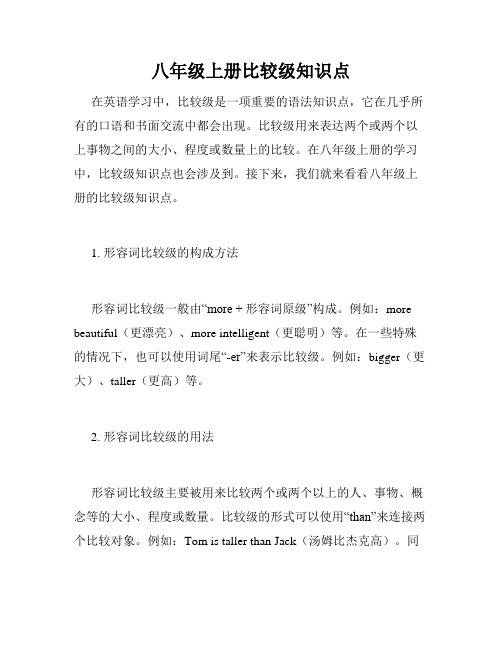
八年级上册比较级知识点在英语学习中,比较级是一项重要的语法知识点,它在几乎所有的口语和书面交流中都会出现。
比较级用来表达两个或两个以上事物之间的大小、程度或数量上的比较。
在八年级上册的学习中,比较级知识点也会涉及到。
接下来,我们就来看看八年级上册的比较级知识点。
1. 形容词比较级的构成方法形容词比较级一般由“more + 形容词原级”构成。
例如:more beautiful(更漂亮)、more intelligent(更聪明)等。
在一些特殊的情况下,也可以使用词尾“-er”来表示比较级。
例如:bigger(更大)、taller(更高)等。
2. 形容词比较级的用法形容词比较级主要被用来比较两个或两个以上的人、事物、概念等的大小、程度或数量。
比较级的形式可以使用“than”来连接两个比较对象。
例如:Tom is taller than Jack(汤姆比杰克高)。
同时,比较级也可与“the + 形容词原级”连用。
例如:The more, the merrier(人多热闹)。
3. 副词比较级的构成方法副词比较级的基本构成方法为在词尾加上“-er”,例如:faster (更快)、higher(更高)等。
但是,对于以“y”结尾的单音节副词,在选取比较级时,需要将“y”变为“i”,再加上“-er”。
例如:happy → happier(更快乐)、busy → busier(更繁忙)等。
4. 副词比较级的用法副词比较级通常用于比较时间、速度、程度等概念。
比较级也可以使用“er...than”的形式进行表示。
例如:The train runs faster than the bus(火车比汽车跑得更快)。
同时,比较级也可用来进行修饰,例如:The more carefully you study, the more you will learn (你学得越仔细,你就学得越多)。
5. 不规则比较级形式有一些比较级形式是不规则的。
人教版英语八年级上册比较级最高级归纳
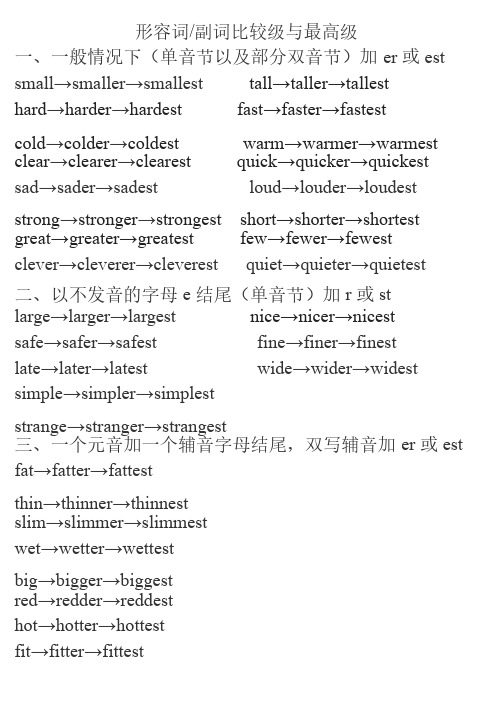
形容词/副词比较级与最高级一、一般情况下(单音节以及部分双音节)加er或est small→smaller→smallest tall→taller→tallesthard→harder→hardest fast→faster→fastest cold→colder→coldest warm→warmer→warmest clear→clearer→clearest quick→quicker→quickest sad→sad er→sadest loud→louder→loudest strong→stronger→strongest short→shorter→shortest great→greater→greatest few→fewer→fewest clever→cleverer→cleverest quiet→quieter→quietest 二、以不发音的字母e结尾(单音节)加r或st large→larger→largest nice→nicer→nicestsafe→safer→safest fine→finer→finest late→later→latest wide→wider→widest simple→simpler→simplest strange→stranger→strangest 三、一个元音加一个辅音字母结尾,双写辅音加er或est fat→fatter→fattest thin→thinner→thinnest slim→slimmer→slimmest wet→wetter→wettest big→bigger→biggest red→redder→reddest hot→hotter→hottestfit→fitter→fittest 四、辅音字母加y结尾,变y为i加er或est easy→easier→easiest angry→angrier→angriest busy→busier→busiest heavy→heavier→heaviest hungry→hungrier→hungriest crazy→crazier→craziest happy→happier→happiest early→earlier→earliest dirty→dirtier→dirtiest lucky→luckier→luckiestshy→shier→shiest funny→funnier→funniest lovely→lovelier→loveliest friendly→friendlier→friendliest 五、双音节以及多音节词前加more或most outgoing→more outgoing→most outgoing beautiful→more beautiful→most beautifuldifferent→more different→most differentquietly→more quietly→most quietly loudly→more loudly→most loudly slowly→more slowly→mo st slowly quickly→more quickly→mo st quickly sadly→more sadly→mo st sadly happily→more happily→mo st happily carefully→more carefully→mo st carefully serious→more serious→most serious →mo st similar similar→more similar→moeasily easily→more easily→most e asily clearly→more clearly→mo st clearly bored→more bored→mo st bored talented→more talented→mo st talented boring→more boring→mo st boring →mo st popular popular→more popular→moterrible→more terrible→mo st terrible delicious→more delicious→mo st delicious →mo st different different→more different→mo→mo st difficult difficult→more difficult→mo→mo st beautiful beautiful→more beautiful→moexpensive→more expensive→mo st expensive necessary→more necessary→mo st necessary →mo st important important→more important→mo→mo st wonderful wonderful→more wonderful→mocomfortable→more comfortable→mo st comfortable hardworking→more hardworking→mo st hardworking 不规则adj、adv比较级、最高级good/well→better→best bad/badly/ill→worse→worst many/much→more→most few/little→less→least old→older/elder→oldest/eldest far→farther/further→farthest/furthest 无比较级的adj/adv fantastic excellent favorite true(ly) false right wrong full empty round square possible impossible 。
人教版八年级英语上册形容词和副词比较级

你越认真,犯错就越少。
5、Which/Who + 谓语v. + 比较级,A or B? “A或B,哪一个/谁更......”
Which is bigger, the Earth or the Moon? Who draws better, Jenny or Danny?
most serious
boring -- more boring
most boring
thin -- thinner thinnest
loudly -- more loudly
most loudly
friendly -- friendlier
friendliest
形副比较级常用句型
1、A + be + 形容词比较级 +than + B A + 实意动词 + 副词比较级 + than + B
oldest/eldest farther/further
Exercise
写出下列单词的比较级和最高级形式
long -- longer longest
heavy -- heavier heaviest short -- shorter shortest serious -- more serious
标志词 句意
than,even,much等 and连接两个并列成分
句型
Exercise
1、The more you simle, the ______ you will feel.
A. happy
B. happier
八年级上册语法学习比较级

PART.2
比较级的基本用法
比较级的基本用法
在句子中表示两个或多个事物之间的比较关系:例如:My brother is taller than me.(我的哥哥比我高。) 在句子中使用than来引导比较的对象:例如:John runs faster than Mary.(约翰跑得比玛丽快。) 在句子中使用最高级形式来表示三者或三者以上的比较关系:例如:Alice is the tallest in her class.(爱丽丝是班上最高的。)
thin--thinner
02
5.所有多音节或部分双音节形容词或副词的比较级,在原级
前加more如:outgoing-more outgoinginteresting--
more interesting quickly--more quickly slowly-
more slowly
形容词或副词的比较级和最高级的构成规则
八年级上册unit3语 法学习比较级
汇报人:xxxx
日期:20XX
-
目录
01
形容词或副词的比 较级和最高级的构
成规则
02
比较级的基本用法
八年级上册unit3语法学习比较级
Grass gets greener Days gets warmer Sun gets brighter brighterand brighter Dreams get bigger Smiles get wider Love gets stronger stronger and stronger
- 1、下载文档前请自行甄别文档内容的完整性,平台不提供额外的编辑、内容补充、找答案等附加服务。
- 2、"仅部分预览"的文档,不可在线预览部分如存在完整性等问题,可反馈申请退款(可完整预览的文档不适用该条件!)。
- 3、如文档侵犯您的权益,请联系客服反馈,我们会尽快为您处理(人工客服工作时间:9:00-18:30)。
八年级上形容词与副词的比较级与最高级
姓名:得分:
(一)规则变化:
1.绝大多数的单音节和少数双音节词,加词尾-er ,-est tall—taller—tallest
2.以不发音的e结尾的单音节词和少数以-le结尾的双音节词只加-r,-st
nice—nicer—nicest , able—abler—ablest
3.以一个辅音字母结尾的重读闭音节词或少数双音节词,双写结尾的辅音字母,再加-er,-est
big—bigger—biggest
4.以辅音字母加y结尾的双音节词,改y为i再加-er,-est easy—easier—easiest
5.少数以-er,-ow结尾的双音节词末尾加-er,-est clever—cleverer—cleverest,
narrow—narrower—narrowest
6.其他双音节词和多音节词,在前面加more,most来构成比较级和最高级
easily—more easily—most easily
(二)不规则变化
常见的有:
good / well—better—best ; bad (ly)/ ill—worse—worst ; old—older/elder—oldest/eldest many / much—more—most ; little—less—least far—farther/further—farthest/furthest ; 用法:
1.原级比较:as + adj./adv. +as(否定为not so/as + adj./adv.
+as)
当as… as中间有名字时,采用as + adj. + a + n.或as + many / much + n.
This is as good an example as the other is .
I can carry as much paper as you can.
表示倍数的词或其他程度副词做修饰语时放在as的前面This room is twice as big as that one.
倍数+as+adj.+as = 倍数+the +n.+of
Your room is twice as larger as mine. = Your room is twice the size of mine.
2.比较级+ than
比较级前可加程度状语much, still, even, far, a lot, a little, three years. five times,20%等
He is three years older than I (am).
表示“(两个中)较……的那个”时,比较级前常加the(后面有名字时前面才能加冠词)
1)He is the taller of the two brothers. /
2)He is taller than his two brothers.
3)Which is larger, Canada or Australia? /
4)Which is the larger country, Canada or Australia?
可用比较级形式表示最高级概念,关键是要用或或否定词等把一事物(或人)与其他同类事物(或人)相分离He is taller than any other boy / anybody else.
Nobody is taller than him.
比较对象相同时,可用that, those等代词代替第二个比较对象
The weather in Shanghai is better than that in Wuhan.
比较级+ than与not so/as + adj./adv. +as的相互转换Maria is not so / as brave as Helen. = Helen is braver than Maria.
Nothing is so easy as this. = Nothing is easier than this. =
This is the easiest thing.
3.“比较级+ and + 比较级”表示“越来越……”(加more构成比较形式的,只重复more,不重复原形容词或副词
colder and colder , more and more beautiful
4.“the +比较级(……),the +比较级(……)”表示“越……,越……”
The earlier you start, the sooner you will be back.
5.降级比较用“the + 原级形容词或副词(不论是单音节还是多音节的)+ than 从句”
Today is less cold than yesterday.
6.一些特殊比较词组:
no more than 不过,仅仅;同……一样不能not more than至多,不超过
no less than 多达,有……之多(加数字)(强调数量之多,带有感情色彩);一样,不亚于,恰好
not less than不少于(加数字)(无强调多少之意)7.the + 最高级+ 比较范围(in表示环境范围;of或among 表示对象范围)
He is the tallest of / among the boys.
He is the tallest in his class.
最高级前不加the情况:
①作表语的形容词最高级前,如果不是和别人(或别物)相比,常不加the We are busiest on Monday.
②形容词最高级前有物主代词时,不再加the
Wang Hai is my best friend.
③最高级形式有时并不表示最高级概念,它只表示非常或“在很大程度上”,这时前边一般不加the
It’s a most important question. = It’s a very important question.(一)写出下列形容词与副词的比较级与最高级形式:long_____ ______ wide ______ _______ fat ____ _____ heavy____ ______ slow ______ _______ few____ _____ brightly______ -_____ bably _____ _______ far____ _____ quickly _____ ______ happy_____ -______ unhappy________
(二)用所给词的正确形式填空:
1. Of the two girls, I find Lucy the _______ (clever).
2. Gold(黄金) is ______ (little) useful than iron(铁).
3. My sister is two years _______ (old ) than I.
4. John’s parents have four daughters, and she is the _____ (young) child.
5. The _____ (cheap) bags are the not usually the best ones.
6. The short one is by far _______ expensive of the five.
7. The boy is not so ______ (interesting) as his brother.
(三)选择填空:
1.He feels _____ today than yesterday.
A. tired
B. more tired
C. more tireder
D. much tired
2. Which do you like _____, coffee, tea or milk?
A. the worst
B. worse
C. the worse
D. worst
3. Of the two toys, the child chose_____.
A. the expensive one
B. one most expensive
C. a least expensive
D. the most expensive of them
4. The line is ____ than that one.
A. more longer
B. not longer
C. much more longer
D. many more longer
5. The earth is _____ the moon.
A. as 49 times big as
B. 49 times as bigger as
C. 49 times as big as
D.as big as 49 times。
